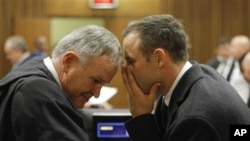JOHANNESBURG —
The first witness in the murder trial of South African Olympian Oscar Pistorius spent several hours being grilled by defense attorney Barry Roux in a Pretoria courtroom Monday and Tuesday.
During testimony from the stand Monday, University of Pretoria economics professor Michelle Burger, a neighbor of Pistorius at the time of the shooting, described "blood curdling screams" moments before hearing shots in the early hours of February 14, 2013.
Oscar Pistorius has acknowledged fatally shooting girlfriend Reeva Steenkamp that night, but he rejects the charge that he did so on purpose.
Burger's memory of that night, and her interpretation of events that transpired, came under heavy scrutiny by Pistorius' lawyer.
Roux asked Burger whether she knew what gunshots sounded like or who was screaming; whether she thought it was a burglary; whether she and her husband reported a different amount of shots in their initial statements; and whether news coverage might have colored her testimony.
In a country that has never televised its criminal proceedings, the sight of Roux drilling Burger with often repetitive questions — at one point the prosecution objected and accused Roux of badgering the witness — seemed a bit harsh.
According to Professor James Grant of Johannesburg's Witwatersrand School of Law, although every cross examination is about trying to catch witnesses' mistakes, Roux provided a spectacular example of a protracted line of questioning designed to wear the witness down.
"I think a spectacular example of an attempt at that was over the last two days now, with the defense of Oscar Pistorius grilling the first witness and taking so long with her, because one can imagine that quite naturally over time one can grow fatigued," he said. "He is looking for the slightest deviation from what she originally said, including what she might have said in statements, at which point he then would, of course, pounce on that and make the argument that she is contradicting herself and that she is confused. Of course that can call into question her credibility and the value of all of her evidence."
Roux, who has practiced law since 1982, is one of the country's foremost defense advocates. As more witnesses took the stand Tuesday, he practiced the same method, attempting to point out contradictions and inconsistencies in their statements and answers.
When questioning one's own witness, Grant says, advocates have to be careful about perceptions and language.
"You have to effectively allow them to tell their own story," he said. "You cannot put any particular version to them. And the point of that is that you do not want, on the part of the lawyer, leading, or leading evidence in chief. You don't want them putting words in their own witnesses' mouth."
The state is planning to call as many as 107 witnesses. The trial, headed into its third day Wednesday, is on witness number three.
During testimony from the stand Monday, University of Pretoria economics professor Michelle Burger, a neighbor of Pistorius at the time of the shooting, described "blood curdling screams" moments before hearing shots in the early hours of February 14, 2013.
Oscar Pistorius has acknowledged fatally shooting girlfriend Reeva Steenkamp that night, but he rejects the charge that he did so on purpose.
Burger's memory of that night, and her interpretation of events that transpired, came under heavy scrutiny by Pistorius' lawyer.
Roux asked Burger whether she knew what gunshots sounded like or who was screaming; whether she thought it was a burglary; whether she and her husband reported a different amount of shots in their initial statements; and whether news coverage might have colored her testimony.
In a country that has never televised its criminal proceedings, the sight of Roux drilling Burger with often repetitive questions — at one point the prosecution objected and accused Roux of badgering the witness — seemed a bit harsh.
According to Professor James Grant of Johannesburg's Witwatersrand School of Law, although every cross examination is about trying to catch witnesses' mistakes, Roux provided a spectacular example of a protracted line of questioning designed to wear the witness down.
"I think a spectacular example of an attempt at that was over the last two days now, with the defense of Oscar Pistorius grilling the first witness and taking so long with her, because one can imagine that quite naturally over time one can grow fatigued," he said. "He is looking for the slightest deviation from what she originally said, including what she might have said in statements, at which point he then would, of course, pounce on that and make the argument that she is contradicting herself and that she is confused. Of course that can call into question her credibility and the value of all of her evidence."
Roux, who has practiced law since 1982, is one of the country's foremost defense advocates. As more witnesses took the stand Tuesday, he practiced the same method, attempting to point out contradictions and inconsistencies in their statements and answers.
When questioning one's own witness, Grant says, advocates have to be careful about perceptions and language.
"You have to effectively allow them to tell their own story," he said. "You cannot put any particular version to them. And the point of that is that you do not want, on the part of the lawyer, leading, or leading evidence in chief. You don't want them putting words in their own witnesses' mouth."
The state is planning to call as many as 107 witnesses. The trial, headed into its third day Wednesday, is on witness number three.




